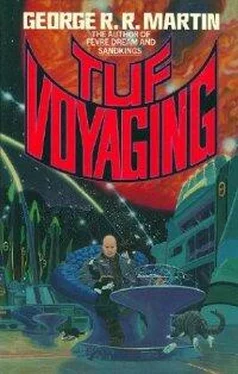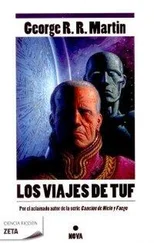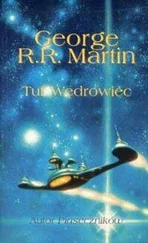The tyrannosaur roared.
It was, thought Haviland Tuf, a thoroughly frightening sound. He pressed his lips firmly together in annoyance and squirmed back another half-meter into his niche. He was decidedly uncomfortable. Tuf was a big man, and there was very little room down here. He sat with his legs jammed under each other awkwardly, his back bent over in a painful manner, and his head bumping against the work station above. Yet he was not ungrateful. It was a small niche, true, but it had given him a place to seek shelter. Fortunately, he had been deft enough to attain that shelter. He was fortunate, also, in that the work station, with its waldos and microscanner and computer terminal, rested upon a heavy, thick, metal table that extruded itself from floor and wall, and not simply a flimsy item of furniture to be easily brushed aside.
Nonetheless, Haviland Tuf was not entirely pleased with himself. He felt foolish; his dignity had been decisively compromised. No doubt his ability to concentrate on the task at hand was, in its own way, commendable. Still, that degree of concentration might be considered a liability when it allowed a seven-meter-tall carnivorous reptile to sneak up on one.
The tyrannosaur roared again. Tuf could feel the work station vibrate overhead. The dinosaur’s massive head appeared about two meters in front of his face, as the beast leaned over, counterbalanced by its great tail, and tried to get in at him. Fortunately, its head was too large and the niche too small. The reptile pulled out and screamed its frustration; echoes rebounded all up and down the central cloning chamber. Its tail lashed around and smashed into the work station; the sheltering table shook to the impact, something shattered up above, and Tuf winced.
“Go away,” he said as firmly as he could. He rested his hands atop his paunch and attempted to look stern.
The tyrannosaur paid him no heed . . . “These vigorous efforts will avail you naught,” Tuf pointed out. “You are too large and the table too sturdily built, as would be readily apparent to you had you a brain larger than a mushroom. Moreover, you are undoubtedly a clone produced from the genetic record contained within a fossil. Therefore, it might be argued that I have a superior claim to life, on the grounds that you are extinct and ought properly to remain so. Begone!” The tyrannosaur’s reply was a furious squirming lunge and a wet bellow that sprayed Tuf with fine droplets of dinosaur saliva. The tail came down once more.
When she first caught a flicker of movement out of the corner of her eye, Celise Waan squeaked in panic.
She backpedaled and whirled to face—to face what? There was nothing there. But she had been certain that she’d seen something, up near that open door. What, though? Nervously, she unholstered her dart-pistol. She’d abandoned the laser rifle quite a distance back. It was cumbersome and heavy, and the effort of lugging it around had tired her out. Besides, she doubted that she’d be able to hit anything with it. The pistol was much preferable, in her view. As Jefri Lion had explained it, it threw explosive plastic darts, so she would not actually have to score a hit , just come close.
Warily, she moved toward the open door. She paused to one side of it, raised her pistol high, thumbed off the safety, and then peered quickly into the room.
Nothing.
It was some kind of storage room, she saw, full of plastisealed equipment piled high on floater skids. She glanced around uneasily. Had she imagined it, then? No. As she was about to turn away, she saw it once more, a tiny darting shape that appeared on the periphery of her vision and vanished before she could quite get a clear look at it.
But this time she had seen where it had gone. She hurried after it, feeling bolder now; it had, after all, been quite small.
She had it cornered, she saw when she rounded the looming equipment skid. But what was it? Celise Waan moved closer, gun at the ready.
It was a cat.
It stared at her steadily, its tail flicking back and forth. It was kind of a funny cat. Very small—a kitten, really. It was pale white, with vivid scarlet stripes, an oversized head, and astonishing lambent crimson eyes.
Another cat, thought Celise Waan. That was all she needed: another cat.
It hissed at her.
She drew back, a little startled. Tuf’s cats hissed at her from time to time, especially the nasty black-and-white one, but not like that. That hiss was almost, well, reptilian. Chilling, somehow. And its tongue . . . it seemed to have a very long, very peculiar tongue.
It hissed again.
“Here, kitty,” she called. “Here, kitty.”
It stared at her, unblinking, cold, haughty. Then it drew itself back and spat at her. The spittle struck her square in the center of her faceplate. It was thick greenish stuff, and it obscured her vision for a moment until she wiped it away with the back of her arm.
Celise Waan decided that she’d had enough of cats. “Nice kitty,” she said, “come here, kitty. I’ve got a present for you.”
It hissed again, drew back to spit.
Celise Waan grunted and blew it to hell.
The plasma cannon would dispose of Kaj Nevis handsomely; on that score Jefri Lion had no doubt. The strength of the armor on that alien battlesuit was an unknown factor. If it was at all comparable to the armored suits worn by the Federal Empire’s own assault squads during the Thousand Years War, it might be able to deflect laser fire, to withstand small explosions, to ignore sonic attacks, but a plasma cannon could melt through five meters of solid duralloy plate. One good plasma ball would instantly turn any kind of personal armor into slag, and Nevis would be incinerated before he even understood what had hit him.
The difficulty was the size of the plasma cannon. It was unfortunately cumbersome, and the so-called portable version, with its small energy-pac, took almost a full standard minute after each shot to generate another plasma ball in its force chamber. Jefri Lion was acutely and uncomfortably aware that, were he to miss Kaj Nevis, he would be unlikely to get a second shot. Moreover, even on its tripod, the plasma cannon was unwieldy, and it had been many years since he had been in the field, and even then, his strong suits had been his mind and his tactical sense, not his reflexes. After so many decades at the ShanDellor Center, he had no great confidence in his eye-hand coordination.
So Jefri Lion concocted a plan.
Fortunately, plasma cannons had often been employed for automated perimeter defense, and this one had the standard minimind and autofire sequence. Jefri Lion erected the tripod in the middle of a broad corridor, approximately twenty meters down from a major intersection. He programmed in an extremely narrow field of fire, and calibrated the targetting cube with the utmost precision. Then he initiated the autofire sequence and stepped back with satisfaction. Inside the energy-pac he saw the plasma ball forming, burning brighter and brighter, and after a minute the ready light flashed on. Now the cannon was set, and its minimind was vastly quicker and more deadly accurate than Lion could ever hope to be firing manually. It was targeted on the center of the corridor intersection ahead, but it would fire only at objects whose dimensions exceeded certain preprogrammed limits.
So Jefri Lion could dash right through the cannon’s target cube without fear, but Kaj Nevis, following in his absurdly huge battlesuit, would meet with a hot surprise. Now it only remained to lure Nevis into the appropriate position.
It was a stroke of tactical genius worthy of Napoleon or Chin Wu or Stephan Cobalt Northstar. Jefri Lion was infinitely pleased with himself.
The heavy footsteps had grown louder as Lion had worked with the plasma cannon, but in the last minute or so they had begun to fade; Nevis had obviously taken a wrong turn and would not be coming to the right position of his own accord. Very well then, Jefri Lion thought; he would bring him there.
Читать дальше












